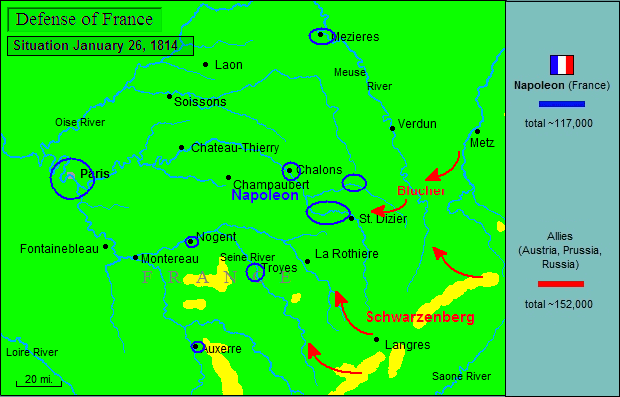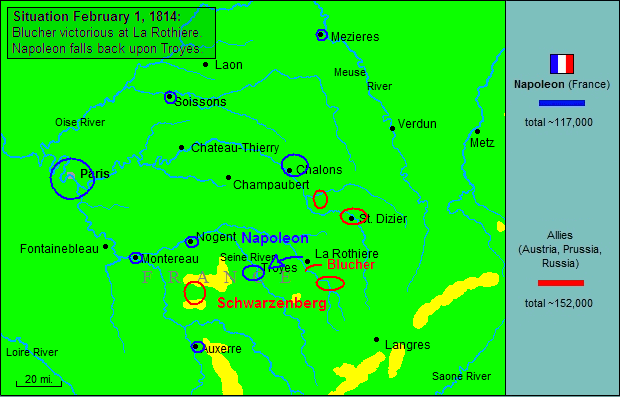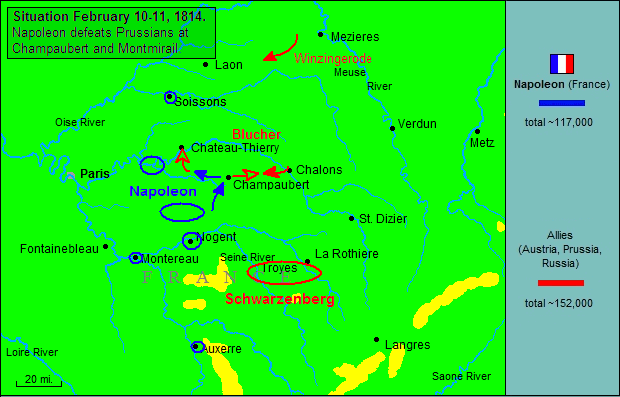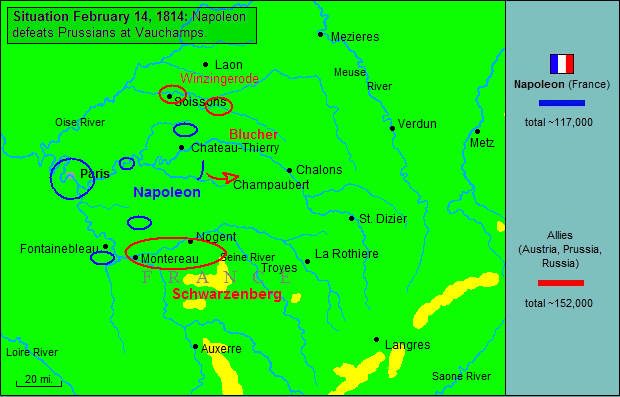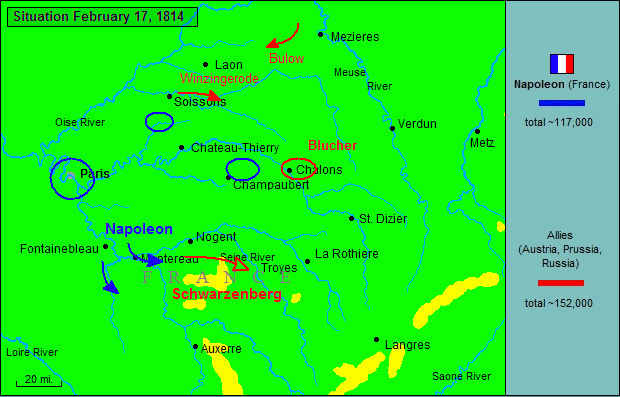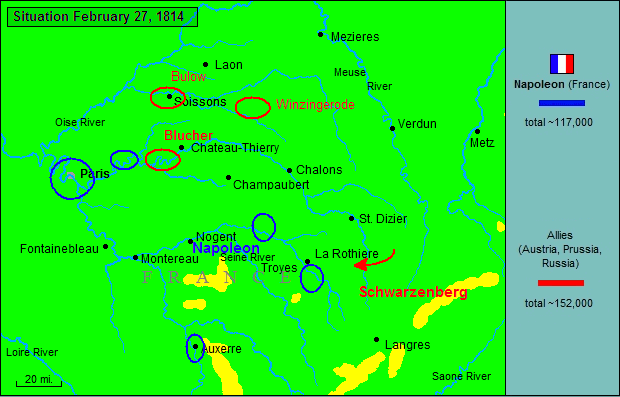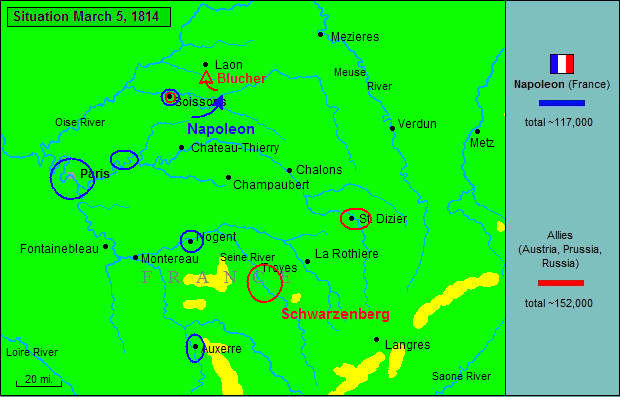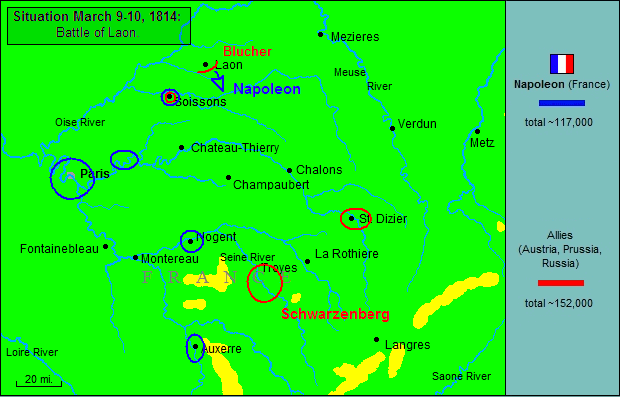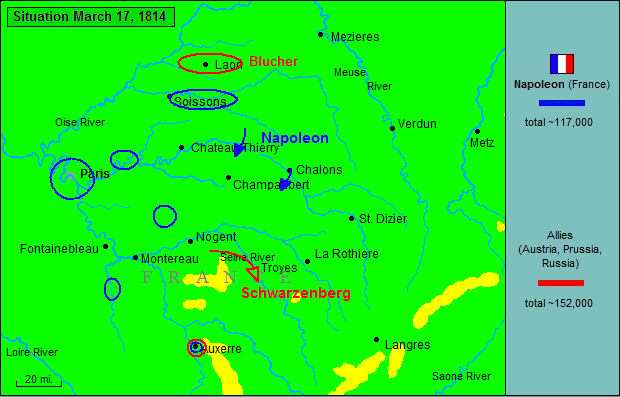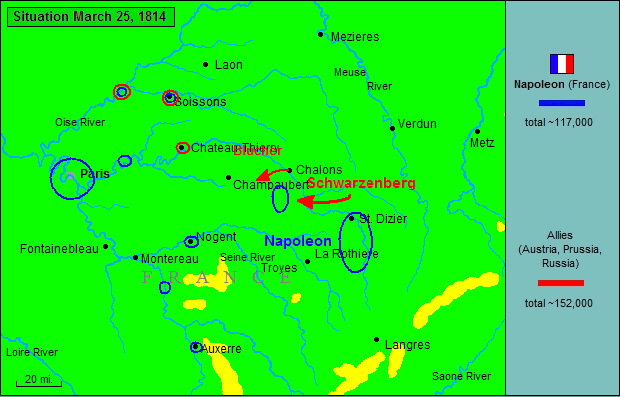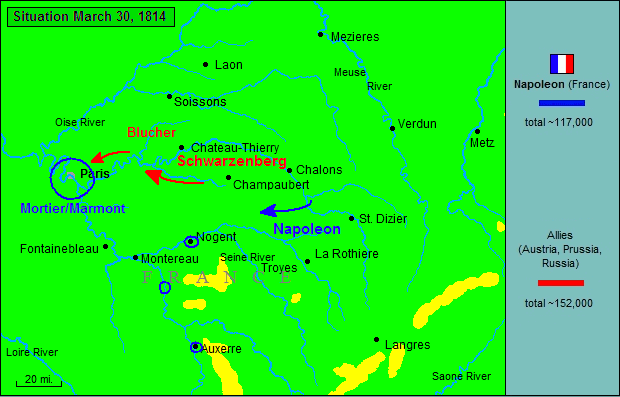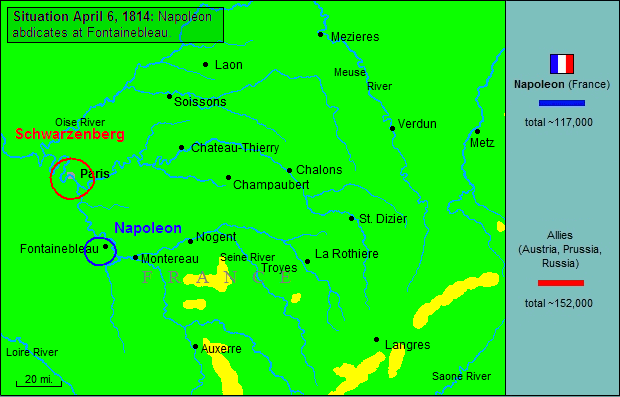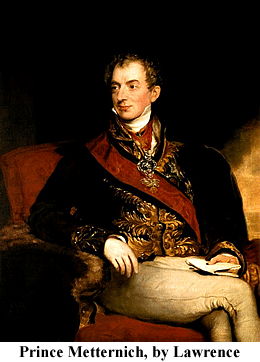
Responding to fears that he was prepared to destroy the country for the sake of his own dynastic ambitions, Napoleon delivered a speech to a joint session of the legislature in which he assured the people’s representatives that in carrying on the war he sought only to establish France’s “natural frontiers” (the traditional territory of 1792, plus the left bank of the Rhine). To reinforce a perception of the popular basis for the war, he offered to reveal all negotiations with the Allies to both chambers of the legislature for their approval. The proposal was quickly endorsed by the Senate, but an overwhelming majority of the lower house called for further guarantees that the rights of the people would be respected. Thinking to have made a magnanimous gesture and fully expecting the unanimous support of a grateful nation, Napoleon was outraged by the apparent lack of trust in his leadership. As he saw it, the representatives were seeking to use a moment of national crisis to enhance their political power, and like Louis XVI before him, he summarily adjourned the offending body. The Revolution had come full circle.
Meanwhile, having returned from Leipzig with some 80,000 fought-out troops, Napoleon initiated another massive call-up with which to defend the French homeland, once again culling recruits from every available source. On the diplomatic front, he sought to rid himself at last of the incessant problem of Spain, offering to restore Ferdinand to the Spanish throne in exchange for the country’s neutrality. By this time, however, the English and Spanish–whose forces had driven the French out of much of the peninsula and were about to advance upon French territory–were in no mood to accommodate an enemy who had violated Spanish neutrality in taking over the country in the first place. The tables having turned, the Allies were to show little regard for even Switzerland’s neutrality, compelling the Swiss to allow passage of Schwarzenberg’s army in an effort to create as broad an invasion front as possible.
Desperately short of time to rebuild his forces, Napoleon hoped the enemy might call a halt at the frontier, go into winter quarters, and allow him crucial time to prepare a vigorous defense of French territory. But long experience had convinced the Allied commanders of the folly of surrendering the initiative, and thus they pressed forward despite the advancing season. By 1 January 1814, Schwarzenberg’s Army of Bohemia had crossed the French frontier at Basel and begun an advance upon Langres. Shortly thereafter, Blücher, with the Army of Silesia, crossed the Rhine in the vicinity of Mayence, meeting little resistance from two French corps under Morand and Marmont. Finally, Winzingerode’s Army of the North moved on Liege. Thus, the Allies were to employ much the same strategy that had proven successful in the Leipzig campaign, applying pressure on several fronts and attacking where the enemy was weakest.
After completing a series of stopgap arrangements in the capital, Napoleon joined the Guard at Chalons on 26 January, by which time Blücher had crossed the Meuse and driven off Victor’s corps at St. Dizier. Meanwhile, a hard day’s march to the southwest, Schwarzenberg was approaching Bar-sur-Aube, having pressed Mortier back upon Troyes. Quickly concentrating his available forces, Napoleon determined to strike first against Blücher, whose forces had become strung out in an effort to unite with the Austrians. Sending a detachment to retake St. Dizier from a small Prussian rearguard, Napoleon ordered Mortier to advance in support as he prepared to deliver a crushing blow in the vicinity of the town where he had received his first military training, Brienne. As luck would have it, however, a copy of Mortier’s orders fell into Blücher’s hands, enabling the Prussian commander to concentrate his forces sufficiently to fend off the French attack and make a fighting withdrawal through La Rothiere.
Falling back upon Schwarzenberg’s vanguard, Blücher soon regained his composure and on 1 February, reinforced by two Austrian corps as well as the armies of Barclay and Wrede, he counter-attacked at La Rothiere. By this time Napoleon had already begun a withdrawal upon Troyes, and now it was the Emperor’s turn to suffer a surprise attack while his troops were in the process of displacing. Quickly calling back those troops already on the march, he went on the defensive and managed to hold off a force of more than twice his numbers until nightfall, whereupon he disengaged and withdrew as planned.
For Blücher the encounter at La Rothiere had ended wonderfully well. But for the chance discovery of the enemy’s plans, he might well have been knocked out of the war. Instead, he had hung on to hand Napoleon his first defeat on French soil. Now, assuming the French emperor would direct his main effort against Schwarzenberg’s army of 150,000, which now straddled the upper Seine within striking distance of Paris, the Prussian commander raced north to pounce on Macdonald’s isolated army on the Marne. Instead of fixing Napoleon in his front, however, Schwarzenberg managed to lose contact with the enemy’s main force and, fearing an attack on his left, withdrew south of the Aube, calling upon Blücher to send reinforcements. Thus, the Prussians had no sooner crossed the Marne than their commander faced about and countermarched two corps southward, leaving the rest of the army to look out for itself.
At this point, intent on ridding himself of the Prussian bulldog once and for all, Napoleon left Oudinot in front of Schwarzenberg at Nogent and marched northeast with some 31,000 men, aiming to get in Blücher’s rear and destroy him in concert with Macdonald’s force. On 10 February he came upon an isolated Prussian corps (Olssufiev’s) at Champaubert and utterly overwhelmed it. Shortly thereafter, the Prussian vanguard under Sacken, finding itself isolated at La Ferte, countermarched eastward in an effort to reestablish contact with the rest of the army. Instead, they collided head-on with Napoleon’s force as it advanced from Montmirail. Only the late arrival of another Prussian corps (Yorck’s) from Chateau-Thierry saved Sacken from destruction, and at the end of the day, both Prussian corps were streaming northward in headlong retreat. Hoping to trap them at Chateau-Thierry, Napoleon ordered Macdonald eastward, but he arrived too late to cut them off and, what was worse, too late to prevent them from making good their escape by destroying a key bridge across the Marne. Thus, for the second time, the Prussians narrowly escaped a crushing defeat that might have knocked them out of the war.
Meanwhile, Schwarzenberg had gone back on the offensive along the upper Seine, and once again Blücher assumed Napoleon would shift his front to cover Paris. With the same two corps, he had originally intended to send to Schwarzenberg (now all that remained to him of an organized command) he promptly advanced upon Montmirail. Napoleon, however, was not yet finished with him. Ordering Marmont to fall back before the enemy advance, he waited until the Prussian column had become extended in pursuit, then sent Grouchy’s cavalry slashing down on their right flank at Vauchamps. Scattering the enemy’s vanguard, Grouchy raced eastward–minus his artillery, which became bogged down in glutinous, mid-winter mud–to cut the Prussian line of retreat in the vicinity of Champaubert. Next, thinking to have run into a single French corps, Blücher drew up his forces at Vauchamps and prepared for a standup fight, confident that Napoleon was far to the south. The sudden appearance of the Guard informed him otherwise, however, at which point he quickly faced about and countermarched to Champaubert. With Napoleon in hot pursuit, the Prussians shoved their way through Grouchy’s line and fled in the direction of Chalons. Thus, for the lack of a few heavy guns, Napoleon had lost yet another opportunity to knock Blücher out of the war.
Nevertheless, news of Blücher’s defeat gave Schwarzenberg a severe case of the jitters. By this time, 14 February, the Austrian commander had crossed north of the Seine to a position between Montereau and Nogent and was within one hard push of Paris, which had yet to be fortified. Now he paused, allowing Napoleon time to race southeast to Guignes and prepare a counter-offensive. On the 17th the French emperor lashed out at the encroaching enemy, crushing the Allied vanguard and driving Wrede back upon Nangis. The advance quickly gaining momentum as increasing numbers of Allied troops gave way and began making tracks for the bridges across the Seine at Montereau, Bray, and Nogent. Racing forward to maintain contact, the French cavalry managed to seize the Montereau bridge before it could be destroyed, enabling Napoleon–who still lacked bridging materials–to hustle his forces across and keep up the pressure.
With no time to regain his balance, Schwarzenberg fell back in considerable disorder as far as Troyes. Meanwhile Blücher–who had reassembled his forces in Chalons–came up in support north of the Seine at Mery. At this point, Napoleon confronted a combined enemy force well over twice his own strength, yet with one Allied army north of the river and the other south of it, he continued to press forward, seeking to destroy the Austrian army before Blücher could effect a crossing and join with it. Once again giving way to fears of being cut off and destroyed, Schwarzenberg made a belated–and, under the circumstance, rather craven–appeal for an armistice, and promptly ordered a retreat in the direction of Langres.
At this point talk of an armistice could scarcely be viewed as anything but an attempt to temporize, for by now both sides had become hardened by the particular cruelty of winter warfare. Metternich’s diplomatic initiative notwithstanding, the invading armies had engaged in widespread and deliberate pillaging and burning from the outset of the campaign, and in response French partisans had become increasingly active, carrying out brutal reprisals and keeping the enemy in a state of perpetual anxiety. Even so, Napoleon agreed to open negotiations based on the restoration of France’s “natural frontiers,” indicating his intention to continue hostilities until an armistice was signed. Two months earlier, at Frankfort, the Allies had been willing to accept the Rhine as France’s eastern boundary, but now, having penetrated deep within French territory, they demanded the surrender of Belgium and the Low Countries as well as Savoy and Nice, former duchies of the Kingdom of Sardinia. This meant that after some twenty years of sacrifice and hardship, the country would be reduced to her pre-Revolutionary frontiers. For Napoleon such terms were unacceptable, representing a repudiation of his empire, if not his genius, at a moment when he had scored a series of victories against very long odds. Even his political fortunes seemed on the verge of a dramatic recovery; on the morning of the 24th he entered Troyes to the wild cheers of a population that had seen quite enough of the supposed benevolence of their Allied “liberators.”
And so the bitter struggle continued. With Napoleon’s main force in pursuit of Schwarzenberg, who was now falling back upon Langres, Blücher once again determined to march on the French capital. Advancing upon La Ferte, he pressed Marmont and Mortier back upon Meux and began moving his army north of the Marne in an effort to protect his left flank (now uncovered by Schwarzenberg’s withdrawal). In two days of fighting along the Ourcq River, however, the Prussians were turned back, and with Napoleon’s arrival opposite La Ferte on the first or March, Blücher destroyed the Marne bridge and withdrew to the north.
Still without bridging materials, Napoleon was held up for the better part of a day at La Ferte, but once across the river, he took up the chase in earnest, hoping to pin Blücher against the swollen Aisne. Now, with Soissons in French hands, the Prussians would be hard-pressed to find a way across the Aisne before he caught up with them, and when the town’s garrison held out against an initial attempt by Winzingerode to storm it, the opportunity to destroy the Prussian army once again presented itself. At this point, however, despite plentiful supplies and the near approach of supporting forces, the commander of the French garrison at Soissons, General Moreau, succumbed to the enemy’s threats and capitulated, neglecting even to destroy the bridge that represented the Prussians’ surest means of escape. Blücher’s luck–by which he had escaped destruction on two previous occasions–was holding.
His original plan thwarted by Moreau’s incompetence, Napoleon turned east, following the route of the Prussian trains toward Berry. Once again, as in his earliest campaigns and on so many occasions since, the speed with which he altered his plans and resumed the initiative threw the enemy off guard, and on 4 March he was able to seize the bridge at Berry, recapturing Rheims as a bonus. The next day, with the French streaming across the bridge at Berry, Blücher was forced to abandon the line of the Aisne and rush east to protect his flank. The initial clash of the two armies took place on the 7th at Craonne, where the Prussians were eventually driven back in confused yet bitter fighting. Retiring northward, Blücher turned to fight once again at Laon, where he was determined to hold fast to excellent defensive terrain. At last, Napoleon was going to get his chance to meet the Prussians in a stand-up fight, and accordingly, he made careful preparations, drawing up his forces in front of the city and sending Marmont against the enemy’s left flank at Athies.
After a sluggish start, Marmont seized the town and sent a detachment westward to establish contact with the main army. Having once achieved his objective, however, he retired for the night to a chateau some two miles from town, failing to make adequate arrangements for the defense of his position. That night a concerted Prussian counter-attack fell on the isolated French corps, which fled southward, narrowly escaping destruction when Prussian cavalry seized a vital pass at Festieux. By morning Marmont’s entire corps had been utterly routed, and the Prussians were poised to strike Napoleon’s right rear. Just when Blücher was about to reap the rewards of his persistent aggressiveness, however, the seventy-two-year-old commander collapsed from exhaustion, and in the absence of his determined leadership, the Prussians hesitated, allowing Napoleon to slip away and reorganize his forces at Soissons.
Laon would prove the beginning of the end for the French. Upon learning of Blücher’s victory, Schwarzenberg once again went on the offensive, and within days his army was back on the upper Seine. Meanwhile, Blücher slowly recovered his strength, and a Prussian detachment succeeded in capturing Rheims. Napoleon responded by racing eastward from Soissons to reclaim it, once again baffling the enemy with the alacrity of his movement. For all of his speed and daring, however, he could not be in two places at once, and his marshals were incapable of withstanding the steady encroachment of the invading armies without him. With his headquarters now in Rheims, Napoleon was farther from Paris than either Blücher or Schwarzenberg, and with less than 25,000 men under his immediate command, he lacked the manpower to achieve a decisive victory against either one. Elsewhere, Bordeaux had fallen to the English, and Augereau had been driven from Lyons. On every side, the enemy was closing in.
Fighting on against seemingly insurmountable odds, he struck south from Rheims, sending Schwarzenberg’s forces scampering back to a defensive line between Troyes and Bar-sur-Aube and reaffirming his reputation in a sharp engagement at Arcis. By this time, however, all hope of holding the capital was fading fast, and in a last-ditch effort to turn the tide, he called upon his marshals to join him in the vicinity of St. Dizier. By massing along Schwarzenberg’s line of communication, he hoped to force the Allied commander to turn and give battle. Instead, Schwarzenberg marched on Paris, colliding with Marmont and Mortier en route and driving them back upon the city.
Meanwhile, in Paris, the emperor’s brother, Joseph, having made few preparations for an effective defense, fled at the first sound of the enemy’s guns. In chaotic fighting throughout 30 March, Marmont and Mortier were steadily driven out of the city, and the next day Tsar Alexander and King Frederick William led a victory procession down the Champs Elysees. Later that day the Tsar met with the former French foreign minister, Talleyrand, who quickly set about to revenge himself on Napoleon for the humiliations of the past, convincing the vacillating Tsar (whose motives for revenge were no less compelling) that the French were prepared to accept a Bourbon restoration if the Allies showed sufficient resolve. Talleyrand then went on to form a provisional government and eventually persuaded Marmont to support it.
Napoleon, meanwhile, had rushed westward in the wake of the Allied advance. Too late to save the capital, he drew up his forces some 35 miles south of the city at Fontainbleau, with plans to fight another battle. With 60,000 men and the help of partisans within the city, he might yet achieve a dramatic victory over the now-isolated invaders. At this point, however, a number of the marshals (including Ney, Oudinot, and Macdonald), came forward in protest, fearing the destruction of the capital and the onset of civil war. When Napoleon tried to reassure them, Marshal Ney angrily refused to march and made bold to suggest that the army would obey its generals rather than the emperor (a hollow boast, and with respect to the Imperial Guard, at least, scarcely accurate). Nevertheless, Napoleon relented, agreeing to abdicate in favor of his son, the King of Rome. On 4 April he wrote:
Since the allied powers have proclaimed the Emperor Napoleon the sole obstacle to the re-establishment of peace in Europe, the Emperor Napoleon, faithful to his oath, states that he is ready to relinquish the throne, to leave France and even to give up his life for the good of the country, which is inseparable from the rights of his son, from those of the Regency of the Empress, and from the maintenance of the laws of the Empire.
The offer was delivered to the Allied leaders, and the next day–again at Talleyrand’s prompting–Alexander insisted that the abdication be unconditional. Napoleon received the Tsar’s demand even as he learned of Marmont’s defection, and, overwhelmed by a sense of betrayal and loss, agreed to comply. It was over: the campaign, the empire, the dynasty, and the Revolution itself. During the next several days the details of the pending abdication were worked out according to the Allies’ desire to remove and humiliate the former emperor without injuring the pride of the French people. The resulting arrangement was richly ironical; having dominated the entire continent for more than a decade, Napoleon was to be exiled on a tiny island five miles off the coast of Tuscany, retaining the official title, ‘Emperor, and Sovereign of the Isle of Elba.’
For Napoleon, however, the cruelest stroke came in the Allied refusal to allow Marie-Louise and the King of Rome to join him, and when it became clear that his wife and son had fallen under Austrian control, he succumbed to despair. Early on the morning of 13 April, convinced that he was to be assassinated, he decided to end his life. In his quarters at Fontainebleau he drank a mixture of opium, belladonna, and white hellebore he had had his surgeon prepare during the Russian campaign. Then, calling for Caulaincourt, he gave a series of final instructions and embraced his faithful aide in a final good-bye. Moments later he doubled over with violent pains in his stomach, and, realizing what had happened, Caulaincourt ran for the surgeon. Upon his return, Napoleon was discovered hiccuping uncontrollably and soon began coughing up the poisonous compound. (During the dark days of the retreat from Moscow he had ordered a double dose of the poison to insure a speedy death; instead, the mixture had an emetic effect, preventing him from fully absorbing it.) Wracked with pain, he pleaded with both Caulaincourt and the surgeon to put him out of his misery, but both refused.
By morning, the violent illness had begun to pass, and when a letter full of affectionate devotion arrived from Marie-Louise, his spirits brightened. Having lived through all manner of dangers, he had now survived even his own hand, and, convinced once again of his special destiny, he resolved to face whatever fate had in store for him. Later that day he signed the Act of Abdication and in the week that followed a total of 1,000 of his Guard were allowed to join him in exile. On the 20th, in the courtyard at Fontainebleau Napoleon bid an emotional farewell to those of the Guard who would be left behind, then entered his carriage to begin the long journey to the Mediterranean coast.
For much of the trip, the former emperor was cheered by his loyal supporters in the countryside, but upon entering Provence the procession was set upon by crowds of angry women seeking revenge for the loss of their husbands and sons. At one point, in an incident that would haunt him with shame for the rest of his life, Napoleon was so thoroughly terrified that he sought protection behind one of his generals. Eventually boarding the British ship Undaunted at Frejus, he sailed for Elba, looking forward to the joys of a simple life. Marie-Louise, meanwhile, had been granted the Italian duchies of Parma, Piancenza, and Guastalla, which, given their proximity to Elba, allowed him to entertain the possibility of extended visits from his wife and son. As it happened, however, he was never to see either of them again.

